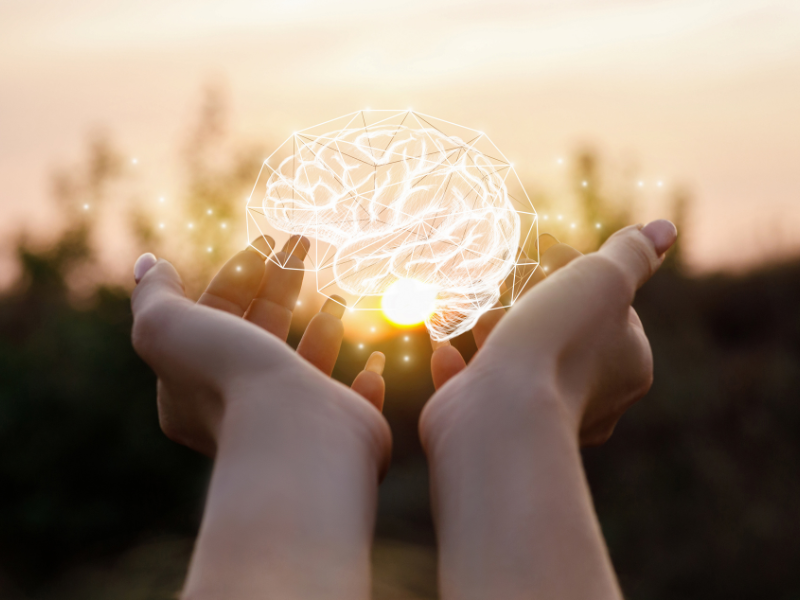20/12/2021
Brain-restoring impact of magnesium L-threonate

MIT researchers have discovered and patented magnesium L-threonate (MgT) based on its unique ability to boost brain levels of magnesium.
As we age, our brain undergoes changes that can lead to cognitive decline and memory impairment. It's a natural part of the aging process, but recent advancements have shown that these changes may not be irreversible. Researchers have been exploring various compounds and strategies to counteract brain aging and promote cognitive function.
The key mechanism through which magnesium exerts its brain-protective effects is its involvement in the activation of the NMDA receptor, a critical receptor involved in learning and memory processes. Magnesium acts as a secondary activator of the NMDA receptor, ensuring the proper functioning of synapses. Without sufficient magnesium, synaptic function is impaired.
Brain plasticity, which refers to the brain's ability to form new connections between neurons, is the foundation of learning and memory. (10) As we acquire new information, electro-chemical signals are transmitted between neurons through the synaptic cleft.
This process allows the brain to create new neural pathways or connections that facilitate communication. Brain plasticity is crucial for memory formation, learning new skills, and adapting to new concepts. (1) However, as we age, brain plasticity diminishes, resulting in cognitive decline. (2-5)
Previous beliefs suggested that the loss of brain plasticity was an inevitable consequence of aging. However, recent studies have shown that increasing brain magnesium levels can reverse the decline in brain plasticity, leading to significant restoration of cognitive function in both healthy individuals and those with neurodegenerative diseases. (5)
The secret of magnesium L-threonate
Why is MgT important for your cognitive function?
Rapid absorption and the ability to enter the brain can enable this magnesium to structurally reverse certain aspects of brain aging (6-10). Magnesium-L-threonate can offer an increase of brain magnesium levels by up to 15%.
Animal studies have demonstrated substantial improvements in memory, learning, and cognition with supplementation of magnesium-L-threonate. Additionally, laboratory studies have shown corresponding improvements in synaptic structures, indicating enhanced brain plasticity. Read more about this key function of MgT below!
Magnesium L-threonate has unique abilities
This unique magnesium for the brain was developed at MIT
The most startling finding is a reversal of more than nine years in clinical measures of brain aging in people who supplemented with magnesium L-threonate. Magnesium L-threonate (MgT) was developed at the Massachusetts Institute of Technology (MIT).
MgT (pronounced “Mag T”) is special because of the way it boosts brain magnesium levels when taken orally. This effect is due to its unique ability to cross the blood-brain barrier (7).
Research has shown that once MgT gets into the brain and increases the density of synapses, which are the communication connections between brain cells (6).
This is critical because loss of synaptic density is associated with brain shrinkage and cognitive decline (11,12). By enhancing synaptic density, magnesium L-threonate supports the regeneration of brain structures, promoting cognitive function and memory recall.
Protection against age-related cognitive decline
Age-related cognitive decline is a growing concern for many individuals. Magnesium L-threonate has shown promise in protecting against cognitive decline by improving various aspects of brain health. It enhances executive function, attention, and working memory while reducing anxiety and stress levels.
Further research has investigated the potential of magnesium-L-threonate in treating Alzheimer's disease, which is characterized by the loss of synapses and impaired brain plasticity. In mouse models of Alzheimer's disease, magnesium-L-threonate prevented the loss of synapses and memory decline.
Moreover, the compound has been found to suppress the aggregation of beta-amyloid plaques, a hallmark of the disease, suggesting a potential role in prevention.
Excitingly, magnesium-L-threonate has also shown promise in aiding individuals with post-traumatic stress disorder (PTSD). By enhancing brain plasticity, this compound helps in fading fear memories associated with traumatic events, offering potential relief for individuals with PTSD, anxiety, and depression.
A human study demonstrates the benefits of magnesium L-threonate in adults with cognitive dysfunction, sleep disorders, and anxiety (1). The groundbreaking human trial further validated the cognitive benefits of magnesium L-threonate.
Adults aged 50-70 with cognitive impairment who received daily supplementation of magnesium L-threonate experienced a significant improvement in overall cognitive ability.
Executive functioning, which involves abstract thinking, planning, and decision-making, showed particular improvement. Remarkably, the trial revealed a reversal of brain aging by approximately 9 years based on cognitive measures. (1)
Supporting neurotransmitter balance in the brain
Supporting Neurotransmitter Balance
Neurotransmitters play a vital role in the brain's communication network. Magnesium L-threonate supports neurotransmitter balance, promoting optimal brain function. By modulating neurotransmitter levels, this remarkable compound helps maintain mental clarity, focus, and overall cognitive performance.
Magnesium plays a critical role in regulating the formation of synaptic connections between brain cells. Magnesium ions control and regulate ion channels and intercellular connections in brain cells, which are essential for optimal plasticity. (13,14)
Insufficient magnesium levels have been shown to impair brain cells' ability to participate in plasticity, leading to memory deficits. (15,16) Low magnesium levels can also contribute to an increased risk of neurodegenerative diseases. (17)
Studies in animals have shown that increasing brain magnesium levels enhances synaptic plasticity, leading to improved cognitive function. It not only improves the performance of existing synapses but also promotes the growth of new synapses, ultimately enhancing learning and memory. (18,19)
Choosing the MgT supplement
Look for a high-quality product that is backed by scientific
The development of magnesium L-threonate represents a significant breakthrough in brain regeneration and offers great potential for individuals seeking to enhance their neurological well-being.
Its unique ability to raise brain magnesium levels and promote synaptic plasticity makes it a promising tool for combating cognitive decline and supporting optimal brain function.
Though, when considering a magnesium L-threonate supplement, it's important to choose a high-quality product that is backed by scientific research and manufactured with stringent quality control measures.
Life Extension's Neuro-Mag® Magnesium L-Threonate
Magnesium plays a role in more than 300 biochemical reactions in your body, and Neuro-Mag® Magnesium L-threonate can:
- Support cardiovascular- and bone health
- Encourage energy metabolism
- Promote the mood, and most importantly:
- Contribute to maintaining a normal cognitive function
Life Extension Europe offers two premium-quality magnesium L-threonate supplements that are specially formulated to deliver optimal brain-restoring benefits.
- Neuro-Mag® Magnesium L-threonate as a powder supplement
- Neuro-Mag® Magnesium L-threonate in 90 vegetarian capsules
Read more blog posts
References
- Fuchs E, Flugge G. Adult neuroplasticity: more than 40 years of research. Neural Plast. 2014;2014:541870.
- Mahncke HW, Bronstone A, Merzenich MM. Brain plasticity and functional losses in the aged: scientific bases for a novel intervention. Prog Brain Res. 2006;157:81-109.
- Wang D, Jacobs SA, Tsien JZ. Targeting the NMDA receptor subunit NR2B for treating or preventing age-related memory decline. Expert Opin Ther Targets. 2014 Oct;18(10):1121-30.
- Abumaria N, Yin B, Zhang L, et al. Effects of elevation of brain magnesium on fear conditioning, fear extinction, and synaptic plasticity in the infralimbic prefrontal cortex and lateral amygdala. J Neurosci. 2011 Oct 19;31(42):14871-81.
- Basheer MP PKK, Sreekumaran E, et al. A study of serum magnesium, calcium and phosphorus level, and cognition in the elderly population of South India. Alexandria J Med.
- Li W, Yu J, Liu Y, et al. Elevation of brain magnesium prevents synaptic loss and reverses cognitive deficits in Alzheimer's disease mouse model. Mol Brain. 2014 Sep 13;7:65.
- Huang Y, Huang X, Zhang L, et al. Magnesium boosts the memory restorative effect of environmental enrichment in Alzheimer’s disease mice. CNS Neurosci Ther. 2018 Jan;24(1):70-9.
- Li W, Yu J, Liu Y, et al. Elevation of brain magnesium prevents synaptic loss and reverses cognitive deficits in Alzheimer’s disease mouse model. Mol Brain. 2014 Sep 13;7:65.
- Slutsky I, Abumaria N, Wu LJ, et al. Enhancement of learning and memory by elevating brain magnesium. Neuron. 2010;65(2):165-77.
- Abumaria N, Yin B, Zhang L, et al. Effects of elevation of brain magnesium on fear conditioning, fear extinction, and synaptic plasticity in the infralimbic prefrontal cortex and lateral amygdala. J Neurosci. 2011;31(42):14871-81.
- Li W, Yu J, Liu Y, et al. Elevation of brain magnesium prevents synaptic loss and reverses cognitive deficits in Alzheimer’s disease mouse model. Mol Brain. 2014;7:65.
- Fox NC, Scahill RI, Crum WR, et al. Correlation between rates of brain atrophy and cognitive decline in AD. Neurology. 1999;52(8):1687-9.
- Terry RD, Masliah E, Salmon DP, et al. Physical basis of cognitive alterations in Alzheimer’s disease: synapse loss is the major correlate of cognitive impairment. Ann Neurol. 1991;30(4):572-80.
- Liu G, Weinger JG, Lu ZL, et al. Efficacy and Safety of MMFS-01, a Synapse Density Enhancer, for Treating Cognitive Impairment in Older Adults: A Randomized, Double-Blind, Placebo-Controlled Trial. J Alzheimers Dis. 2016;49(4):971-90.
- Danysz W, Parsons CG. The NMDA receptor antagonist memantine as a symptomatological and neuroprotective treatment for Alzheimer's disease: preclinical evidence. Int J Geriatr Psychiatry. 2003Sep;18(Suppl 1):S23-32.
- Xu ZP, Li L, Bao J, et al. Magnesium protects cognitive functions and synaptic plasticity in streptozotocin-induced sporadic Alzheimer's model. PLoS One. 2014;9(9):e108645.
- Taniguchi R, Nakagawasai O, Tan-no K, et al. Combined low calcium and lack magnesium is a risk factor for motor deficit in mice. Biosci Biotechnol Biochem. 2013;77(2):266-70.
- Palacios-Prado N, Chapuis S, Panjkovich A, et al. Molecular determinants of magnesium-dependent synaptic plasticity at electrical synapses formed by connexin36. Nat Commun. 2014 Aug 19;5:4667.
- Fuchs E, Flugge G. Adult neuroplasticity: more than 40 years of research. Neural Plast. 2014;2014:541870.





